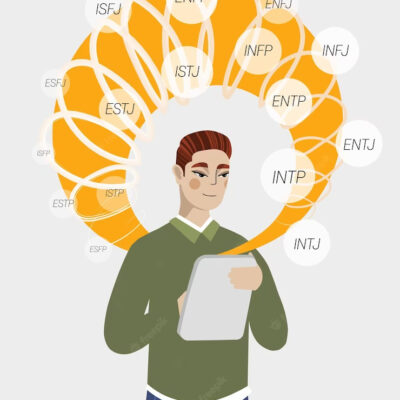The ISTP personality type is one of the eight introverted types in the Myers-Briggs Type Indicator (MBTI). The MBTI is a widely-used tool for understanding different personality types and how they interact with the world around them. Introverted types make up half of the MBTI system and are often characterized as being reflective, reserved, and thoughtful.
Understanding introverted personality types can be incredibly valuable, both in personal relationships and in professional settings. By recognizing the unique strengths and challenges of each type, we can learn to communicate more effectively, collaborate more successfully, and lead more empathetically.
In this article, we’ll take a closer look at the ISTP personality type, including its key characteristics, common careers and interests, strengths and weaknesses, and famous examples of individuals with this personality type. By the end of this article, you’ll have a better understanding of what it means to be an ISTP and how this type can contribute to the world around us.
A brief overview of the personality ISP type
ISTP is a personality type in the MBTI system, and it stands for Introverted, Sensing, Thinking, and Perceiving. People who are classified as ISTPs tend to be introspective, analytical, and independent individuals who thrive on understanding the world around them through direct experience and experimentation.
Key characteristics
ISTPs are known for their practicality, self-reliance, and adaptability. They tend to be skilled at fixing things, figuring out how things work, and using logic and reasoning to solve problems. They are often calm and level-headed in high-pressure situations and can make quick decisions when needed. However, they may struggle with expressing their emotions or connecting with others on an emotional level, which can make it difficult for them to form close relationships.
Common careers and interests
Because of their analytical and hands-on nature, ISTPs tend to excel in fields that require technical knowledge and problem-solving skills. Common careers for ISTPs include engineering, mechanics, IT, law enforcement, emergency services, and skilled trades like carpentry or welding. ISTPs also tend to have a love for adventure and excitement, and they may enjoy hobbies like extreme sports, travel, and exploration.
Overall, ISTPs are adaptable and practical individuals who excel at hands-on problem-solving and thrive in dynamic environments. By understanding their unique strengths and challenges, we can learn to better communicate with and appreciate the ISTPs in our lives.
Strengths and Weaknesses of the ISTP Personality Type
Strengths of the personality type
ISTPs have a number of strengths that allow them to excel in certain areas. For example, they tend to be practical and hands-on, which means they can quickly assess a situation and find practical solutions to problems. They are also often skilled at fixing things and figuring out how things work, making them ideal for technical fields.
ISTPs are also known for their adaptability and self-reliance. They are comfortable with change and can quickly adjust to new situations or environments. They tend to be independent thinkers who don’t need a lot of guidance or direction from others.
Weaknesses of the personality type
Despite their strengths, ISTPs also have some weaknesses that can impact their relationships and overall success. For example, they may struggle with expressing their emotions or connecting with others on an emotional level, which can make it difficult for them to form close relationships. ISTPs may also have a tendency to take risks or seek out excitement, which can lead to dangerous or impulsive behavior.
In addition, ISTPs may struggle with long-term planning or committing to a particular course of action. They may become bored or restless with routine or repetitive tasks, which can lead to procrastination or avoidance.
How to maximize the strengths and minimize the weaknesses of the personality type
To maximize the strengths of the ISTP personality type, it’s important to provide opportunities for hands-on learning and problem-solving. ISTPs thrive when they can work with their hands or use their practical skills to solve real-world problems.
To minimize the weaknesses of the ISTP personality type, it’s important to encourage emotional expression and connection with others. ISTPs may need to work on developing their emotional intelligence and communication skills to form closer relationships with friends, family, and colleagues.
In addition, ISTPs may benefit from developing a long-term plan or strategy for their goals, even if it means breaking down larger tasks into smaller, more manageable steps. This can help prevent procrastination and ensure that important tasks are completed on time.
Famous People with the ISTP Personality Type
Examples of well-known individuals with the ISTP personality type
ISTPs have made significant contributions in a variety of fields, from sports to technology to entertainment. Here are a few examples of famous ISTPs:
- Bruce Lee, martial artist, and actor
- Clint Eastwood, actor, and director
- Steve Jobs, co-founder of Apple Inc.
- Michael Jordan, a former professional basketball player
- Tom Cruise, actor
- Harrison Ford, actor
How their personality traits have contributed to their success
The practical, hands-on nature of ISTPs has allowed many famous individuals with this personality type to excel in their respective fields. For example, Bruce Lee’s athleticism and martial arts skills made him a groundbreaking figure in the world of action movies. Clint Eastwood’s attention to detail and practical approach to filmmaking have earned him numerous awards and critical acclaim.
Similarly, Steve Jobs’ ability to envision new products and his hands-on approach to design were instrumental in the success of Apple Inc. Michael Jordan’s natural athleticism and his ability to adapt to different situations made him one of the most successful basketball players of all time.
Challenges they may have faced due to their personality type
Like anyone, ISTPs may face challenges that are unique to their personality type. For example, their tendency to avoid expressing emotions or connecting with others on an emotional level can make it difficult for them to form close relationships. This may have been a challenge for someone like Harrison Ford, who has been married several times but has spoken publicly about his struggles with emotional intimacy.
Similarly, ISTPs may struggle with long-term planning or committing to a particular course of action. This may have been a challenge for someone like Tom Cruise, who has been known to take on risky or unconventional roles and projects throughout his career.
Overall, while ISTPs may face certain challenges, their practical nature, adaptability, and independence can help them succeed in a wide range of fields.
So, there you have it! We’ve taken a closer look at the ISTP personality type, and hopefully, you now have a better understanding of what makes them tick. We’ve talked about how ISTPs tend to be practical, hands-on, and independent, and we’ve also explored some of the strengths and weaknesses of this personality type.
Understanding introverted personality types like ISTP can be incredibly valuable, whether you’re trying to better understand yourself or others around you. By recognizing the unique traits and characteristics of introverted individuals, we can learn to appreciate and work with their strengths, while also being mindful of their potential weaknesses.
So, whether you’re an ISTP yourself or simply curious about introverted personality types, take some time to learn more about the MBTI and what it can tell you about yourself and the people around you. Who knows, you may just discover something new and exciting about yourself or those you interact with on a daily basis!
This piece is a preserved fossil from our earlier ecosystem—beautiful, but part of a simpler food chain. The evolution has been… spectacularly messy. If the core of this resonated with you, your soul might be ready for the full, neurodivergent taxonomy. The journey continues. If you’d like to fuel the next phase of exploration, you can support it here.
Also read: Introverts and Emotional Intelligence: The Basics











I have been browsing online more than three hours today yet I never found any interesting article like yours It is pretty worth enough for me In my view if all website owners and bloggers made good content as you did the internet will be a lot more useful than ever before.